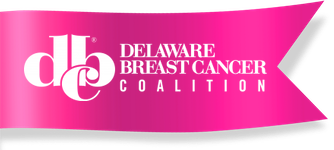The Delaware Breast Cancer Coalition hosted the 27th Annual Breast Cancer Update, with the theme Breast Cancer: The State We’re In, virtually via Zoom on May 14, 2025.
With over 150 registrants, the event provided a wonderful platform for local medical professionals to share valuable educational information.
Dr. Scott Siegel opened the program with a powerful presentation on health disparities in Delaware, focusing on Triple Negative Breast Cancer (TNBC) among Black women. He noted that Black women are 40% more likely to die from breast cancer, with an increased mortality risk for younger Black women. Barriers to mammography contribute to lower screening rates—20% less than White women—and 4 in 10 Black women are diagnosed at an advanced stage, compared to 3 in 10 white women. He identified advanced breast cancer hotspots in communities like Riverside in Wilmington, where less than a third of advanced breast cancer cases were detected through screening, and among women under 50 in Middletown. TNBC hotspots were also found in Wilmington and Bear/New Castle.
Emphasizing the need for equity-driven solutions, Dr. Siegel introduced the concepts of precision medicine and precision public health—tailoring care to individual and community needs based on genetic, environmental, and behavioral factors. He advocated for the deployment of community health workers (CHWs) in high-risk areas to address social determinants of health and improve early detection. “The greatest opportunity to reduce disparities,” he stated, “is by addressing prevention.”
Kendra Flores provided key insights into the importance of genetic testing. Emphasizing that “genetic differences are what makes us, us,” she encouraged ongoing engagement with genetic services, noting that testing evolves over time and should be revisited every 2–3 years. She highly recommended anyone who has been diagnosed with TNBC as well as any men diagnosed with breast cancer consider genetic testing. Flores also assured participants that in-person and telephonic language interpretation services are available to ensure accessibility. She introduced the Tyrer-Cuzick model as a helpful tool for assessing familial breast cancer risk. During the Q&A, participants explored topics such as the Genetic Information Nondiscrimination Act (GINA), insurance implications, MRI safety, and the need to expand genetic research across diverse populations.
Dr. Karen Louie shared updated breast cancer screening recommendations, noting that female breast cancer accounts for 15.5% of all new cancer cases in the U.S. and that death rates have been steadily declining by 1.2% annually from 2014 to 2023. She also highlighted the use of the Tyrer-Cuzick risk model to assess lifetime breast cancer risk and emphasized that individuals at high risk may benefit from early and enhanced screening—such as annual MRIs starting at age 25–30, annual mammograms beginning at age 30, lifestyle changes, and, when appropriate, discussing prophylactic surgery options.
Zachary Bernard, DBCC’s 2025 Grant Recipient, presented his findings with The Chanpyon Project, an effort to discover how to increase screenings among the Haitian community in Sussex County. Some participants noted they lacked transportation to screenings or had doubts because of medical misinformation. Zachary concluded, “The integration of credible messengers and culturally tailored outreach was key to overcoming barriers.”
Dee Iraca, a registered dietitian nutritionist and breast cancer survivor, delivered an empowering presentation on the role of nutrition in managing modifiable risk factors and supporting recovery after a breast cancer diagnosis. She emphasized the importance of mindset shifts—such as focusing on building strength over weight loss and eating mindfully—while also explaining how sleep quality can impact hunger hormones. Iraca highlighted practical strategies like incorporating prebiotics, probiotics, and fiber for gut health and addressed controversy over soy, citing research that suggests early-life soy consumption may reduce breast cancer risk. She concluded her talk with a live cooking demonstration to inspire healthy eating habits.
DBCC’s Breast Cancer Update relies on the generous support of its sponsors. As DBCC CEO Francesca Vogel emphasized, “The Delaware Breast Cancer Coalition is profoundly grateful for the generous support of our sponsors for the 27th Annual Breast Cancer Update.” This year’s event was made possible by the contributions of Delaware Health and Social Services, Delaware Live, Beebe Healthcare, Gannett/USA Today Network (Delaware Online), Grail, iHeart Radio (94.7 WDSD), Coast Life, Delaware First Health, Gilead Oncology, and LPGA Amateur Golf Association Eastern Shore MD/DE. Francesca Vogel further noted, “Your commitment to our mission empowers us to provide vital resources, education, and support to individuals and families affected by breast cancer. Thank you for your partnership in making a difference in our community.”
DBCC expresses its gratitude to all the sponsors, presenters, committee members, and attendees who made this event possible. Presentations are available for viewing at https://debreastcancer.org/breastcancerupdate/.
